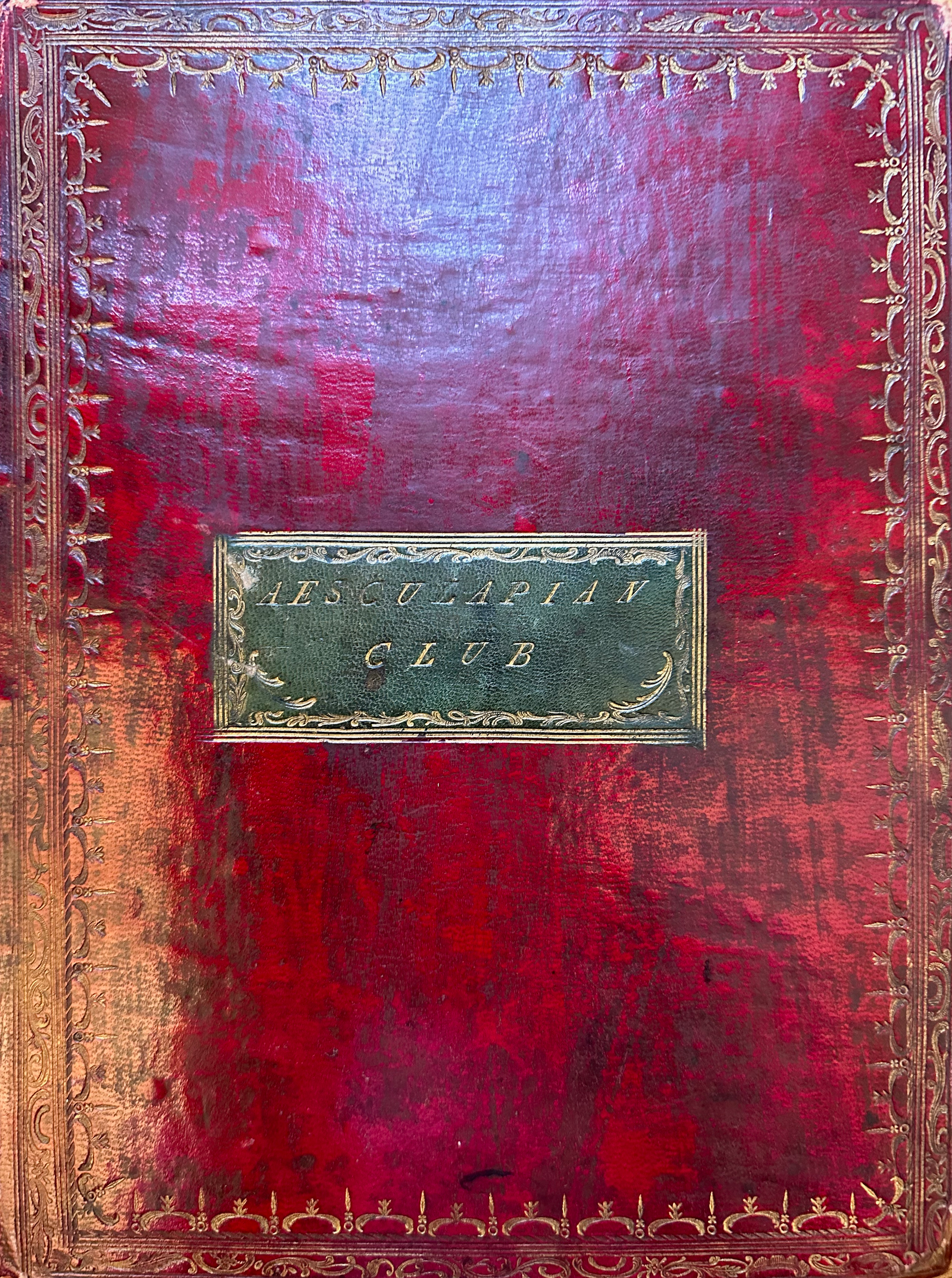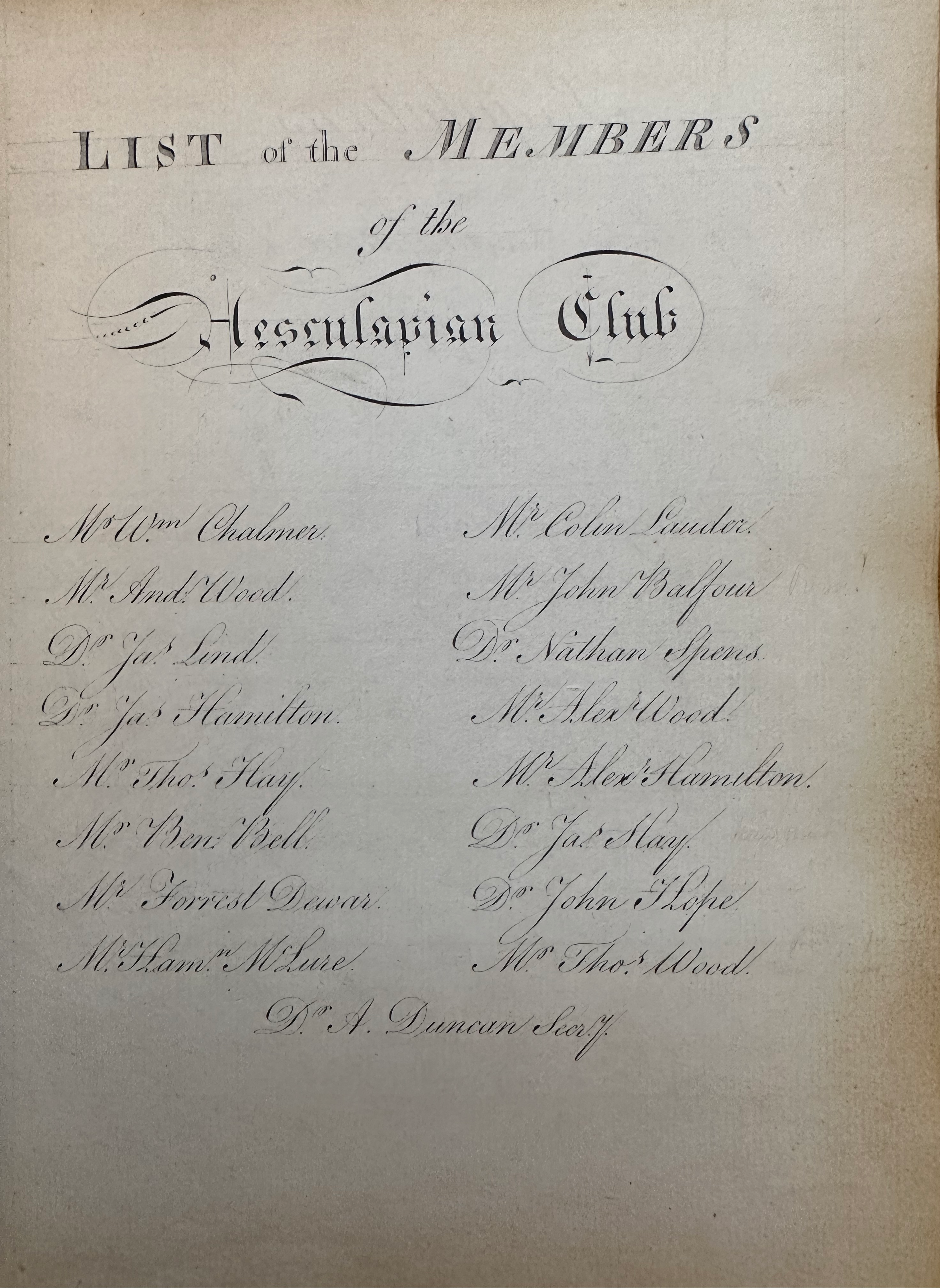Aesculapian Club on:
[Wikipedia]
[Google]
[Amazon]

 The Aesculapian Club of
The Aesculapian Club of

 The Aesculapian Club of
The Aesculapian Club of Edinburgh
Edinburgh is the capital city of Scotland and one of its 32 Council areas of Scotland, council areas. The city is located in southeast Scotland and is bounded to the north by the Firth of Forth and to the south by the Pentland Hills. Edinburgh ...
is one of the oldest medical dining club
A dining club (UK) or eating club (US) is a Social club, social group, usually requiring membership (which may, or may not be available only to certain people), which meets for dinners and discussion on a regular basis. They may also often have g ...
s in the world. It was founded in April 1773 by Dr. Andrew Duncan. Membership of the club is limited to 11 Fellows of the Royal College of Physicians of Edinburgh
The Royal College of Physicians of Edinburgh (RCPE) is a medical royal college in Scotland. It is one of three organisations that set the specialty training standards for physicians in the United Kingdom. It was established by royal charter i ...
and 11 Fellows of the Royal College of Surgeons of Edinburgh
The Royal College of Surgeons of Edinburgh (RCSEd) is a professional organisation of surgeons. The RCSEd has five faculties, covering a broad spectrum of surgical, dental, and other medical and healthcare specialities. Its main campus is locate ...
. 'Extraordinary Membership' is given to members aged over 70 years. The club was established during the Scottish Enlightenment
The Scottish Enlightenment (, ) was the period in 18th- and early-19th-century Scotland characterised by an outpouring of intellectual and scientific accomplishments. By the eighteenth century, Scotland had a network of parish schools in the Sco ...
to encourage convivial relations between Fellows of the two Colleges and to stimulate intellectual discussion. The Club dinners are held in the New Library of the Royal College of Physicians of Edinburgh on the 2nd Friday of March and October each year. The principal guest at each dinner is invited to give a short talk on a non-medical subject and this is followed by a round-table discussion.
Founding members
There were 10 founding members of the Club who attended the first dinner on 2 April 1773. The minutes of that meeting record that 'The Aesculapian Club was conceived in a happy moment, and in due time brought forth. Doctors Duncan and Hamilton, Messrs Hay, Bell, McLure, and Dewar assisted at the birth on the first Friday of April 1773. They also stood as godfathers at the christening. The usual rites and ceremonies usual on these occasions, such as eating a good supper, etc., were concluded with a bumper recommendatory of the club to the peculiar care of Apollo, of Bacchus, and of Venus, Floreat Res Medica. Vivat Veritas.' The club was named afterAsclepius
Asclepius (; ''Asklēpiós'' ; ) is a hero and god of medicine in ancient Religion in ancient Greece, Greek religion and Greek mythology, mythology. He is the son of Apollo and Coronis (lover of Apollo), Coronis, or Arsinoe (Greek myth), Ars ...
, the Greek God of medicine, more usually known by the Roman name, Aesculapius. Aesculapius was the son of Apollo
Apollo is one of the Twelve Olympians, Olympian deities in Ancient Greek religion, ancient Greek and Ancient Roman religion, Roman religion and Greek mythology, Greek and Roman mythology. Apollo has been recognized as a god of archery, mu ...
, who was himself both the God of physic and the sender of disease. The badge of the Club consists of the Latin motto 'Floreat Res Medica' (Let the medical field flourish) and a cockerel. Cockerels adorn many of the fixtures and fittings of the Royal College of Physicians of Edinburgh
The Royal College of Physicians of Edinburgh (RCPE) is a medical royal college in Scotland. It is one of three organisations that set the specialty training standards for physicians in the United Kingdom. It was established by royal charter i ...
. In Greek mythology cockerels were dedicated to Apollo (because their crowing gave notice of the rising sun) and to Aesculapius (because their example of 'early to bed and early to rise' was associated with good health).
Many of these individuals were founder members of the Harveian Society of Edinburgh, which was established in 1782 and still meets on an annual basis.
Former members and previous meetings
There have been 313 past and present members of the Aesculapian Club. Notable former Aesculpians includeJames Lind
James Lind (4 October 1716 – 13 July 1794) was a Scottish physician. He was a pioneer of naval hygiene in the Royal Navy. By conducting one of the first ever clinical trials, he developed the theory that citrus fruits cured scurvy.
Lind ...
, Daniel Rutherford
Daniel Rutherford (3 November 1749 – 15 November 1819) was a Scottish physician, chemist and botanist who is known for the isolation of nitrogen in 1772.
Life
Rutherford was born on 3 November 1749, the son of Anne Mackay and Professor J ...
, Thomas Hope, James Syme, Sir James Young Simpson, Lord Joseph Lister, Joseph Bell
Joseph Bell FRCSE (2 December 1837 – 4 October 1911) was a Scottish surgeon and lecturer at the medical school of the University of Edinburgh in the 19th century. He is best known as an inspiration for the literary character, Sherlock Ho ...
, Douglas Argyll Robertson, Sir Thomas Clouston, Daniel Cunningham, James Haig Ferguson, Sir James Learmonth and Sir Stanley Davidson.
A photograph or picture of Aesculapians from 1821 to the present day is preserved in a 2-volume album. The first volume, which extends to 1939, is kept with other historic papers of the club (including the minutes of previous meetings) in the library of the Royal College of Physicians of Edinburgh
The Royal College of Physicians of Edinburgh (RCPE) is a medical royal college in Scotland. It is one of three organisations that set the specialty training standards for physicians in the United Kingdom. It was established by royal charter i ...
. The Club owns a considerable number of silver cups or ''pocula'' and other table adornments. These include six silver cups with circular rows of hooks, on each of which is hung a medallion with the engraved name, date of election and crest of a former Aesculapian. Three of these cups were presented by the Gymnastic Club (also founded by Dr. Andrew Duncan) on its dissolution in 1836. One of the cups, which contains 9 medallions from 1788 to 1792, is on display in the National Museums of Scotland
National Museums Scotland (NMS; ) is an executive non-departmental public body of the Scottish Government. It runs the national museums of Scotland.
NMS is one of the country's National Collections, and holds internationally important collect ...
.
The Aesculapian Club was originally a supper club and met on the first Friday of every month in local taverns. In 1810, it was converted into a dinner club, with quarterly meetings in March, June, September and December in Edinburgh hotels. In 1924, the Royal College of Physicians of Edinburgh
The Royal College of Physicians of Edinburgh (RCPE) is a medical royal college in Scotland. It is one of three organisations that set the specialty training standards for physicians in the United Kingdom. It was established by royal charter i ...
granted permission for the dinners to be held in the New Library. Although the frequency of dinners has been reduced over the years, the club has met almost continually since its inception. The only times when the Club did not meet were between March 1915 to December 1919 (due to the First World War), October 1939 to December 1945 (due to the Second World War) and March 2020 to October 2021 (due to the COVID pandemic). Several toasts are given throughout the dinner with the final one being "Floreat res medica"; this is a traditional toast, attributed to Andrew Duncan, which is given at the end of many medical dinners in Edinburgh.
Current members and extraordinary members
Honorary Secretary
The Secretary of the Aesculapian Club acts also as the Treasurer and is responsible for the management of all affairs of the club. The Secretary is appointed '' ad vitam aut culpam''. There have been 16 secretaries of the club: Dr. Andrew Duncan (1773-1827); Dr. Richard Huie (1827-1842); Dr. Robert Omond (1842-1877); Dr. Daniel Rutherford Haldane (1877-1887); Dr. John Smith Jr. (1887-1905); Dr. Charles Edward Underhill (1905-1908); Sir George Andreas Berry (1908-1924); Dr. William Fordyce (1924-1933); Dr. William James Stuart (1933-1949); Lt-Col Alexander Dron Stewart (1949–55); Professor Robert William Johnstone (1955-1958); Dr. Clifford Kennedy (1958-1978); Mr. Iain MacLaren 1978–2004; Dr. Anthony 'Tony' Douglas Toft (2004-2014); Dr. Kelvin 'Kel' Palmer (2014-2022); Professor Mark William John Strachan (2022–present). A badge for the Secretary was designed by Sir Andrew Douglas Maclagan in 1857. The badge consists of a silver medal bearing the name of the club with a series of silver bars on the ribbon, each inscribed with the name of a Secretary and their years of office.References
{{DEFAULTSORT:Aesculapian Club of Edinburgh Organizations established in 1773 Organisations based in Edinburgh Clubs and societies in Edinburgh